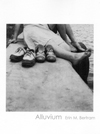Alluvium
I picked up Erin M. Bertram’s Alluvium less on the reputation of its writer, whom I knew little about, than that of its publisher. Kristy Bowen’s dancing girl press is an enviable little operation that publishes handmade chapbooks by a veritable who’s who list of emerging women poets, and I was curious to check out one of its latest offerings.
I picked up Erin M. Bertram’s Alluvium less on the reputation of its writer, whom I knew little about, than that of its publisher. Kristy Bowen’s dancing girl press is an enviable little operation that publishes handmade chapbooks by a veritable who’s who list of emerging women poets, and I was curious to check out one of its latest offerings.
Alluvium is an aptly chosen title for a collection that, indeed, feels sedimentary and made up of a variety of materials: prose, litany, Q&A, epistle, quiz, inventory, travelogue, incantation, etc. The diversity of forms, however, feels a bit heady for 30 pages of poetry, and I often found myself awash in a river of words, grasping for any life-rafts or bits of rope I could find – a state of affairs Bertram almost seems to predict in her dedication: “for those fumbling through & those who make it to the other side.”
Alluvium’s launch is a tricky one to navigate. Bertram presents a post-dedication onslaught of potential obstacles for the jaded or impatient reader: quotes by Jeanette Winterson and Gerard Manley Hopkins, a first line invocation of Keats (“Darkling, listen.”), a potent one-two punch of antiquated diction and alliteration (“In torpor I tarried”), followed by something that sounds suspiciously like an adolescent eating disorder (“stretched hunger’s jaws wide”), and a litany of aimless self-definitions and redefinitions (“am coalesce, racked & eager. Am surfeit, black & rising”). There are birds, trees, hands and rivers. “There is a story trapped inside your body.”
There is also the realization that all her titles utilize what I’ve come to call “hipster brackets,” a trend which originated with D.A. Powell, who uses bracketed titles traditionally, in that his “titles” are actually his first lines standing in as titles (e.g. Powell’s poem “[You’d want to go to the reunion: see]” which begins with the line “you’d want to go to the reunion: see”). It’s ingenious really. But it’s not completely consistent; in a few poems he employs a bracketed title that isn’t repeated in the first line of the poem (e.g. “[12-line poem, seemingly out of place]” which begins “then the vehicular manslaughter took place: a tornado”). The fad this practice gave rise to, however, has gotten completely out of hand with titles bracketed willy-nilly, regardless of whether the title is the first line or resembles any other sort of information which might conceivably belong in brackets. The result – and I say this lovingly, as someone who has been guilty of hipster bracketing – is that we have pointless hipster parentheses cropping up within pointless hipster brackets in titles like Bertram’s “[Travelogue (Breviary)]” and I think it’s high time someone called for an armistice.
But I’m horribly unfair. In torpor I tarry on Bertram’s first poem, when, in fact, I know that the first poem in a book is one of the worst places to judge its worth. The fact is that by and large Bertram’s poetry is darkly sparkling, adroit, well crafted, painterly, vital and sonically rapturous:
God has nothing to do with it. Do the math.
The sacral, the diurnal, the sacred, the dead
. . .
You’d wake the next morning in sweat, taste mint & mineral.
I had wanted to make clear to you the velvet within.
The black smoke, the contour of fire. To describe.
to you a world, the world, to you. Is what I mean.
It’s easy to fall under the sway of Alluvium’s verb-heavy fragments and repetitions: “am adrift. Drifting,” “The snaps, like so, adjust. / They adjust,” “The form thrown, / cast. The figures cast out.” And Bertram’s flair for interlocking images and verbal play feels natural and highly potent: “Gazelle still, no commentary in British tongue, / Just the faint sense of choking back / What otherwise might spread like groundcover.
The ways in which Alluvium can occasionally flounder are by no means terminal. At worst the poems sometimes stray into awkward self-awareness, overindulgence, and a tendency to thesaurusize – not because Bertram uses particularly big words, but because the words she chooses often feel unnecessary, anachronistic, or striving. Does “truth” for instance need to be “burnished” and “hewn?” Isn’t “mantra a splicing of incredulity with sequined allure” gilding the lily a bit? Yes, but I want to stress that I hope Bertram never forces a muzzle over these inclinations. Better to have an overabundance – which will, I’m convinced, learn to temper and regulate itself over time – than to try to coerce poetry out of some imaginative void. I look forward to seeing what Bertram does in a full collection, given more legroom and less rope.
[*Editor’s Note: Erin Bertram has contributed literary magazine reviews to NewPages in the past. However, reviews are not assigned, and this book was selected voluntarily by the review writer.]





